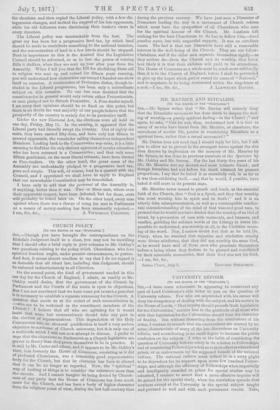CHURCH POLICY.
[TO TRH EDITOR 01? TIIR "SPECTATOR:1 Sin,—Though you have brought the correspondence on the Ridsdale Judgment itself to a close, you may not be unwilling that I should offer a brief. reply in your columns to Mr. Oakley's two questions relating to the policy which Churchmen who love spiritual freedom ought, under present circumstances, to pursue. And first, it seems almost needless to say that 1 do not regard it as desirable that all ritual law, including this Judgment, should
be enforced indiscriminately in all Churches. • On the second point, the kind of government needed in this our day for the Church of England, I admit, as readily as Mr. Oakley could desire, that the government of the Church by Parliament and the Courts of the realm is open to objections. But I am not convinced that we have come yet to such a pass that it is necessary to establish a separate autonomy for the Church. A question that meets us at the outset of such reconstitution is, —who are to be reckoned as the constituent members of the
Church I believe that all who are agitating for it would insist that none but communicants should take any part in the election of representatives. This degradation of the Holy -Communion into an electoral qualification is itself a very serious objection to a scheme of Church autonomy, but it is only one of a multitude which I will not now attempt to discuss. I prefer to urge that the objections to Parliament as a Church legislature are graver in theory than they prove themselves to be in practice. It is said by Mr. Carter and others, and it appears to be Mr. Oakley's view, that formerly the House of Commons, consisting as it did of professed Churchmen, was a reasonably good representative body for the Church, but that its character has been so altered that it can be no longer so regarded. Now, the spiritual " way of looking at things is to consider the substance more than the outside. And I cannot imagine its being denied by Church- men of any party that the House of Commons has done much more for the Church, and has been a body of higher character from the religious point of view, during the last half-century than during the previous century. We have just seen a Dissenter of Dissenters leading the way in a movement of Church reform which must have the sympathies of all Churchmen who care for the spiritual honour of the Church. Mr. Leathern left nothing for the best Churchman to do but to follow him,—pawl passibus icquis, but with respectful support. It was an excellent omen. The fact is that our Dissentera have still a reasonable interest in the well-being of the Church. They are our fellow- Christians, and if the older men separate themselves rigidly—as they seldom do—from the Church and its worship, they know how likely it is that their children will yield to its attractions. The House of Commons as a whole must be much more unfriendly than it is to the Church of England, before I shall be persuaded to give up the hopes which gather round its name of " National," and to acquiesce in its being contracted within the ring-fence of


































 Previous page
Previous page